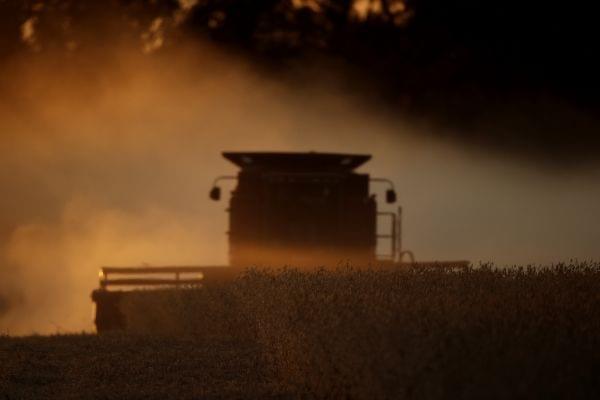How Farmers Are Dealing With This Harvest Season; The Federal Investigation Into IL Government; Downstream Impact Of The Chicago River Reversal

Charlie Riedel/AP
Heavy rain and flooding has made life difficult for farmers this year. We'll check in on how they're doing now that it's harvest season. Plus, more than a hundred years ago, Chicagoans reversed the flow of their city's river to make the water drinkable. But first, what we know and what's at stake in the sprawling federal investigation into Illinois staet government officials.
How Harvests Are Affected By Rain And Floods
This spring, the Midwest was drenched with historic rains. Most areas in Illinois got between 6 and 20 inches more than usual. That’s according to the office of the Illinois state climatologist.
That wet weather has left many farmers across Illinois still feeling the effects this harvest season.
The USDA says as of last week, only 23 percent of Illinois corn had been harvested. A year prior, we were at 70 percent.
Today, we wanted to check in with farmers from across the state to see how their harvest season is going.
Joe Zumwalt farms about 4,000 acres of corn and soybeans near the Mississippi River between Warsaw and Quincy. Rodney Weinzierl is the executive director of the Illinois Corn Growers Association. He’s also a farmer in McLean County.
And, Mark Tuttle is the president of the DeKalb County Farm Bureau. He also grows corn, soy and wheat in Somonauk which is about 25 miles southwest of Aurora.
Rodney Weinzierl (@CornWhisperer @ilcorn) says more than 1.1 MILLION acres of corn were not planted this spring.
— The 21st (@21stShow) October 21, 2019
22 percent of the acres in DeKalb County didn't get planted says Mark Tuttle (@MarkTuttle79 @DCFBureau) "We have farmers up here that planted not one acre of corn."
The Federal Investigation Into IL State Government
Federal authorities are investigating members of Illinois state and local government. It’s probably not the first time you’ve heard that. But this time, the investigation is unique in its scope. It involves everyone from Illinois’ largest public utility, to well connected lobbyists, to the former head of the Senate Transportation Committee whose offices have already been raided by the FBI. And although nobody has been charged with a crime, WBEZ has described this federal probe as “one of the most sprawling investigations in more than a generation.”
Dan Mihalopoulos is an investigative reporter with WBEZ’s government and politics team. Dan Petrella is a state government reporter with the Chicago Tribune.
"All the stuff that we're talking about here, they didn't want us to know. They didn't want the public to know," says @dmihalopoulos. "Sen. President Cullerton thought he was just going to keep this from us. It's a public record in the state."
— The 21st (@21stShow) October 21, 2019
Downstream Impact Of The Chicago River Reversal
It was an engineering marvel at the time. Back in the 1890s, Chicago decided to reverse the course of the river that flowed through the city. Instead of emptying into Lake Michigan, the wastewater was sent the other way, down the Mississippi, and eventually all the way to the Gulf of Mexico. While Chicago may have cleaner drinking water because of it, what effect has this decision had on those of us downstream over the last one-hundred plus years?
WBEZ’s Curious City recently dug into this question about the environmental impact of the Chicago River reversal. And since the direction of the Chicago River doesn’t just affect the state’s largest city, but also the cities south of it on the map, we wanted to explore this question a bit ourselves.
Josh Mogerman is the National Media Director with the Natural Resources Defense Council. Dick Lanyon, most recently served as Executive Director of the Metropolitan Water District of Greater Chicago before retiring. And he’s also authored books on the history of the Chicago River reversal and the drainage system there.
.@JoshatNRDC says reversing the Chicago River has "opened the door to a variety of other issues."
— The 21st (@21stShow) October 21, 2019
Why does the CHICAGO river matter to the rest of us?
Chicago River--> Des Plaines River--> Illinois River --> Mississippi River --> Gulf of Mexico

